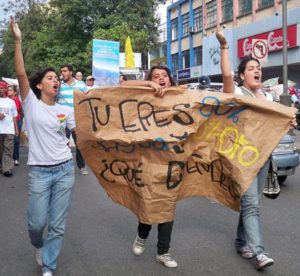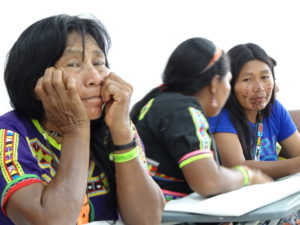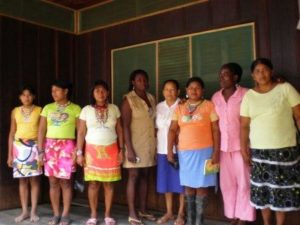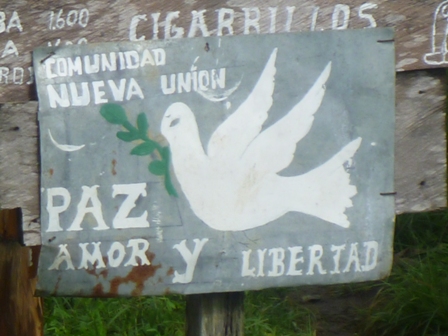by Louise Winstanley (ABColombia)
Women in general, and women from ethnic minorities particularly, suffered a disproportionate level of violence in the armed conflict.[1] The violence that women experience in Colombia was, and continues to be, driven and exacerbated by patriarchal and racist attitudes. During the peace negotiations between the Government and the FARC, women leaders, despite being attacked for highlighting the way in which these attitudes drove the gender-based violence, worked with commitment and dedication to insist that the underlying gender and racial inequalities needed to be addressed in the Colombian Peace Accord. Without these issues being addressed in the Accord and in peacebuilding, transformative changes in these areas will not happen and there will be no sustainable peace for women.
As Colombia moves into peacebuilding, the gendered agreements along with the ethnic chapter provide a human rights framework for the implementation of the Peace Accord. Another innovation is the way in which the Colombian Peace Accord challenges the widely held myth that justice must be sacrificed to obtain peace. By including a human rights framework[2] the Colombian Peace Accord demonstrates that it is possible to achieve both peace and justice in one Accord. This had been difficult in previous peace processes, where the argument has been ‘peace is more important’, resulting in the belief that peace and justice are mutually exclusive.
In the run-up to the negotiations on Truth, Justice and Reparation, Colombian civil society organisations Sisma Mujer, Corporación Humanas and the Red Nacional de Mujeres (National Network of Women’s Organisations) developed a policy document called “Cinco Claves” (Five Key Points), which they presented to the Negotiating Table in Havana. These five key points addressed issues of gender inequality and how gender-based violence in the conflict should be treated in a transitional justice system. One of the elements of these five points insisted that there could be no amnesties for conflict-related sexual violence.
 This was adopted in the Transitional Justice framework in the Peace Accord. It was a major achievement by Colombian CSOs to have conflict-related sexual violence declared in the Accord as a crime that would not receive an amnesty. In addition to this, the agreements state that the Transitional Justice System will provide Special Courts for hearing cases of conflict-related gender-based violence. For Colombian women, the key to a sustainable peace will be that there is truth, justice and non-repetition in terms of gender violence.
This was adopted in the Transitional Justice framework in the Peace Accord. It was a major achievement by Colombian CSOs to have conflict-related sexual violence declared in the Accord as a crime that would not receive an amnesty. In addition to this, the agreements state that the Transitional Justice System will provide Special Courts for hearing cases of conflict-related gender-based violence. For Colombian women, the key to a sustainable peace will be that there is truth, justice and non-repetition in terms of gender violence.
The peace agreement also provides for the creation of an integrated transitional justice system, officially referred to as the Integrated Truth, Justice, Reparation and Non-Repetition System. This is comprised of a truth commission, a unit to search for the disappeared, and a special criminal jurisdiction for peace (JEP) and reparations. According to the UN, the Special Jurisdiction for Peace will require more financial and human resources than any other similar transitional justice initiative in the world because of its complexity.[3] It will examine crimes committed by State Security Forces, the FARC and third parties such as businesses and businesspeople who have directly or indirectly supported the actions of armed groups.
The changed global context due to the work of the UK in campaigning for an end to conflict-related sexual violence, culminating in the Global Summit to End Sexual Violence in Conflict that was held in London in 2014, impacted on global attitudes, making it far less acceptable to amnesty sexual violence in conflict. ABColombia brought a delegation of ten Colombian women to participate in the Global Summit. Two of the organisations that participated in the Global Summit will come back to London this month to participate in an International Conference on 22 November 2017 on “Colombia securing peace: Women’s achievements and the challenges ahead” . These events, combined with the International Criminal Court’s position on amnesties for conflict sexual violence, support the stance taken by Colombian Women’s civil society organisations in the “Cinco Claves” document.
Women and the Transitional Justice System
At the end of September 2017, 51 magistrates were selected from over 2,300 applicants. These were for the courts where those accused of the most atrocious crimes in the conflict will be judged. Therefore, the composition of this group of magistrates is important both in terms of its gender and ethnic balance. Included in those selected were academics, jurists, members of human rights organisations and those experienced in the military justice system. The result of this selection was positive in terms of the gender balance, as 53% of the magistrates selected for the Special Tribunal for Peace are women. However, the same cannot be said for the ethnic balance.
Women and the Implementation of the Peace Accord
In another very positive move, Colombia has set up a High-Level Women’s Sub-Commission to oversee the implementation of the gender-based commitments enshrined in the peace agreements. This Sub-Commission is part of the Commission for Monitoring and Verification of the Peace Accord (CSIVI). Whilst this mechanism will ensure the participation of women in the implementation of the Accord, Colombia still faces a challenge in terms of addressing inclusivity of ethnic minorities. In fact, the recent elections held for a seat to this high-level group of women resulted in not even one Afro-descendant woman being elected to this sub-commission.
 By contrast, the participation of women of peasant farmer communities, who have also suffered disproportionally in the conflict, and who have traditionally faced disproportionate levels of exclusion from decision-making, must be noted positively. Edilia Mendoza, one of the leaders of the Rural Women’s Network, a partner of ABColombia member Oxfam, has been elected to this High-Level Women’s Sub-Commission and will be speaking at the aforementioned conference in London on 22 November (more information about this event is available here).
By contrast, the participation of women of peasant farmer communities, who have also suffered disproportionally in the conflict, and who have traditionally faced disproportionate levels of exclusion from decision-making, must be noted positively. Edilia Mendoza, one of the leaders of the Rural Women’s Network, a partner of ABColombia member Oxfam, has been elected to this High-Level Women’s Sub-Commission and will be speaking at the aforementioned conference in London on 22 November (more information about this event is available here).
A recent UN Global Study describes the peacebuilding period as an opportunity to transform societies.[4] It is therefore essential to work toward equality for women, and at the same time address racism and marginalisation of Indigenous and Afro-descendant women. If Colombia is to build an inclusive peace, then it will need to construct economies, improve services (health, education), access to decision-making and strong institutions that recognise and seek to address the specific equality of access challenges facing women.
According to the Cumbre de Mujeres, many Colombian women who experienced violence, decided to become social leaders, and actively protect and promote the rights of others. These women recognise that the absence of an armed conflict doesn’t necessarily mean peace, as the laying down of arms is only the first step. Social inclusion in decision-making mechanisms, especially in issues to do with land, territory and development, are all key factors in building sustainable peace.[5]
Whilst the election of 53% of women magistrates to the Special Jurisdiction for Peace is a very positive indicator, it remains but a drop in the ocean when looking at the composition of Colombian decision-making bodies and institutions, which are in general responsible for addressing violence against women;[6] this is particularly the case in terms of a lack of ethnic diversity.[7]
 The inclusion of no amnesties for conflict sexual violence has the potential to contribute to changing attitudes and making this crime far less acceptable to commit. However, it does not guarantee the perpetrators will be prosecuted. Potentially, it could transfer the responsibility onto the victim and the victim’s testimony alone for prosecution. Hopefully, this will not be the case. Data from International Tribunals highlight how circumstantial evidence involving the examination of pattern evidence and analysis—from expert testimony to statistics and crime mapping—can be used in the prosecution of sexual violence cases. Given the success of these methods in investigating other war crimes (e.g. massacres), it is remarkable how under-used they are for sexual violence charges.[8] Amnesty International pointed out that pattern evidence and analysis can help to identify cases of sexual abuse as conflict-related and lead to identification of chain-of-command responsibility.[9] One of the major challenges at this historic moment, therefore, is guaranteeing that these first steps in inclusiveness and addressing inequality continue.
The inclusion of no amnesties for conflict sexual violence has the potential to contribute to changing attitudes and making this crime far less acceptable to commit. However, it does not guarantee the perpetrators will be prosecuted. Potentially, it could transfer the responsibility onto the victim and the victim’s testimony alone for prosecution. Hopefully, this will not be the case. Data from International Tribunals highlight how circumstantial evidence involving the examination of pattern evidence and analysis—from expert testimony to statistics and crime mapping—can be used in the prosecution of sexual violence cases. Given the success of these methods in investigating other war crimes (e.g. massacres), it is remarkable how under-used they are for sexual violence charges.[8] Amnesty International pointed out that pattern evidence and analysis can help to identify cases of sexual abuse as conflict-related and lead to identification of chain-of-command responsibility.[9] One of the major challenges at this historic moment, therefore, is guaranteeing that these first steps in inclusiveness and addressing inequality continue.
Notes
The views expressed in this article are the author’s own and do not necessarily represent the position of ILAS or the School of Advanced Study, University of London
Louise Winstanley is the Programme and Advocacy Manager for ABColombia, the advocacy project of a group of five leading UK and Irish organisations with programmes in Colombia: CAFOD, Christian Aid UKI, Oxfam GB, SCIAF and Trócaire. Amnesty International and Peace Brigades International (PBI) are observers. Founded in 1997 to work on the question of forced internal displacement, it has since expanded its mandate to cover human rights and development.
References
[1] For more information on this see ABColombia Report, Women and Conflict related Sexual Violence in Colombia, November 2013
[2] NOREF Report, Innovations in the Colombian peace process, June 2016, by Kristian Herbolzheimer
[3] UNHRC, Annual Report, 2016
[4] UN Women, Preventing Conflict, Transforming Justice, Securing the Peace: A Global Study on the Implementation of United Nations Security Council Resolution 1325, 2015
[5] ‘Las mujeres en la JEP’, El Espectador, 1 October 2017. https://colombia2020.elespectador.com/opinion/las-mujeres-en-la-jep
[6] ibid
[7] ABColombia Report, Colombia: Women, Conflict-Related Sexual Violence and the Peace Process, November 2013 https://www.abcolombia.org.uk/colombia-women-conflict-related-sexual-violence-peace-process/
[8] Xabier Agirre Aranburu, ‘Sexual Violence beyond Reasonable Doubt: Using Pattern Evidence and Analysis for International Cases’, Leiden Journal of International Law, 23, 2010, pp. 609–627.
[9] Amnesty International, Colombia: Hidden from Justice: Impunity for Conflict-Related Sexual Violence, a Follow-up Report, 2012, p. 21.


Recent Comments